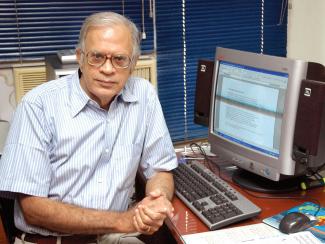
SR Madhu, 73, has had diabetes for 23 years, and has avoided the health hazards faced by his peers. He thanks the diabetes lifestyle for his wellbeing. Plus, his experience of hypoglycaemia.
I was quite upset to discover in 1991 that diabetes had hit me. I had been "on the borderline" of diabetes for a few years whenever I had been tested in India. But when I crossed the international border in 1991 to take up a UN assignment in Zimbabwe, the diabetes crossed the borderline too.
The blood sugar level was fairly high when my diabetes first got detected. (Perhaps one reason was that my family and I had spent a week in Rome, the FAO Headquarters, before arriving in Zimbabwe. Since vegetarian food of my choice wasn't easily available in Rome, I had indulged rather liberally in ice creams!)
My physician in Zimbabwe happened to be a diabetologist. He gave me a strict regimen - one table each in the morning and evening, no sweets, regular timings for food and sleep, regular exercise.
I lost a lot of weight in three months. The sugar level came down dramatically too. The doctor revised the medication. Two tablets a day became one, and then just half.
I moved back to India in 1995. To this day, I continue to take half a tablet a day. Diabetes is now an old friend. The lifestyle imposed by diabetes - moderation in the matter of sweets, regular timings for food, sleep and so on, regular exercise - is a healthy one. My only exercise is walking. I have dabbled in yoga but haven't practiced it systematically. But as a matter of habit I never take the elevator to the first floor or second floor of any building, I walk up. And I always walk down, even from the fourth or fifth floor.
Result: I find that while many friends of my age (I'm 73 now) have suffered heart attacks or cancer, prostate problems, back problems and so on, I haven't. I'm almost sure that it's diabetes - or rather the lifestyle it dictated - that has kept me healthy. Of course, my being a strict vegetarian, non-smoker and teetotaller has helped too.
Hypoglycaemic episodes
One problem that did confront me in Zimbabwe and for the first few years in India was that of hypoglycaemia or low blood sugar. This happens when a diabetic takes his medication, works hard - whether physically or mentally - but doesn't eat at the right time.
Let me explain. When you take a diabetic tablet, you are in effect taking insulin. The tablet's effect is the strongest after three hours. The sugar level in the blood falls. If your stomach is empty then, you are in trouble. You could get dizzy, you could stutter and stammer or get incoherent in speech, you could fall into a dream-like state.
The good thing about hypoglycaemia is that it's treated so easily. Just take a soft drink or chocolates, or milk. The effect is almost immediate, and within 10 minutes you are back to normal.
Different people react in different ways to low blood sugar. In my case, what happens is that I don't speak, I don't even reply to questions. I'm conscious of the other person talking to me, it doesn't occur to me to reply. It's as if he's talking to me in a dream. I clam up. The other person soon realises that something is wrong.
My worst hypoglycaemia experience occurred more than 10 years ago in Chennai. After lunch, I had spent a few hours in an office on some consultancy work, then visited a library and spent several hours there on research. I wasn't conscious of time passing. In fact, I had lapsed unknowingly into a state of non-consciousness. When the library was ready to close, I didn't react and didn't leave.
Three of the library staff talked to me, trying to coax replies out of me. They finally made out that I had come in a car, that it was a Honda, and that my driver was outside. They were able to spot him. They called him and put me in. I saw a doctor the next day, and he told me that I was taking a tablet (Dianyl) , which was too strong for my needs. He prescribed a milder tablet. I have had no problems since. I'm now too experienced as a diabetic to get an attack of hypoglycaemia.
Read now about Jimmy Ong's experience with Hypoglycaemia.
However, complacence is the biggest foe of good health. I find very often that hypochondriacs suffering from a host of ailments for years and years live long. And those who brag about their good health die suddenly when quite young.
The lessons? Moderation. Exercise. And respect for the complex system that's the human body. Don't take it for granted.






